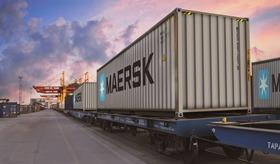
Maersk is announcing an increase of up to two departures per week in its AE19 service as it looks to create more supply chain flexibility in Asia/Europe routing options, in response to Covid-19’s impact,
The AE19 service is a combination of a short-sea and intercontinental rail product between ports in Korea, China and Japan and northern European ports in Finland, Poland, Germany and Scandinavia, with the service covering both westbound and eastbound directions for 'dry, refrigerated and dangerous' cargo.
“The pandemic has triggered some trade bottlenecks in Europe that we can help solve by offering to our customers higher levels of supply chain management, eg further developing rail into a cost efficient, reliable and scalable mode of transport between continents, creating fall back options which seems to be crucial in crisis situations,' said Zsolt Katona, managing director, Eastern Europe at Maersk.
Both northeast Asia and north European shippers have increased bookings on the service, “boosting AE19 volumes by approximately 75 per cent in April, May and June compared to pre-Covid-19; a trend that will likely improve in the second half of the year,” Zsolt pointed out.
The AE19 integrates a short-sea connection between Asian origin ports in Korea, Japan or China and the port of Vostochny in the Russian Far East, followed by an intercontinental rail connection across Russia from Nakhodka to St. Petersburg, which takes 11 days.
The last leg of the product is another short-sea connection between St Petersburg and ports in Finland (Helsinki and Rauma), continental Europe, such as Gdansk (Poland), Bremerhaven (Germany), or Scandinavia.



